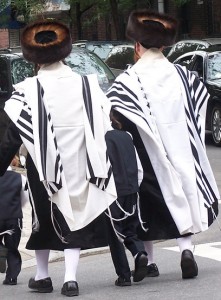 A meme circulating on Facebook recently came from the website JewsNews, which identifies its objective as “bringing truthful news to the world” for its readers, whom it identifies as primarily “Jews and supporters of Israel”. The meme entitled “Let’s Sum Up The Jewish People In A Nutshell” repeated a photo of a presumably Orthodox Jewish man with captions like the following: “Religion doesn’t allow pork . . . doesn’t try to make it illegal,” “Cashier says ‘Merry Christmas’ . . . doesn’t complain about a ‘War on Hanukkah,” and “Thinks differently than you . . . doesn’t tell you you’re going to hell.” I certainly read those captions as an effort to critique particular expressions among some Christians in the United States, presenting “The Jewish People” as more inclusive and respecting.
A meme circulating on Facebook recently came from the website JewsNews, which identifies its objective as “bringing truthful news to the world” for its readers, whom it identifies as primarily “Jews and supporters of Israel”. The meme entitled “Let’s Sum Up The Jewish People In A Nutshell” repeated a photo of a presumably Orthodox Jewish man with captions like the following: “Religion doesn’t allow pork . . . doesn’t try to make it illegal,” “Cashier says ‘Merry Christmas’ . . . doesn’t complain about a ‘War on Hanukkah,” and “Thinks differently than you . . . doesn’t tell you you’re going to hell.” I certainly read those captions as an effort to critique particular expressions among some Christians in the United States, presenting “The Jewish People” as more inclusive and respecting.
Beyond the issues of the exclusions embedded within the implicit pluralism (see Craig Martin’s recent post) and the use of this comparison as an ideological weapon involving much more than an Orthodox Jewish man, the nature of the assumption, explicit in the title, of commonality that the label “Jewish” represents is problematic. While efforts to create a positive image in association with a minority community’s identification are certainly understandable, the broader implications reinforce the assumptions within negative stereotypes, which I suspect the website wants to combat, that generalizations about those who are identified with a label are valid. Not only does the comparison construct an implicit stereotype of Christians, or perhaps conservative Christians, that ignores the complicated diversity among those who identify as Christian, or even conservative Christian, but the assertions also imply that all who identify with “the Jewish People” respond in the same way in these situations.
Reinforcing the notion of commonality among those who identify according to a particular label (or are identified in that manner by others) creates a competition between stereotypes. The debate centers on which traits (benevolent or malevolent) a person has if they identify as Jewish. In other words, the positive construction of “the Jewish people” and anti-Semitism share particular assumptions. It seems that a more effective means to attack negative stereotypes, including anti-Semitism that JewsNews addresses as a distinct website category, would be to problematize the assumption that the Jewish people hold any commonalities of practice, whether positive or negative. And such implicit connotations become a strong reason to avoid declarative phrases such as “the Jewish people” and even general labels such as Jewish and Christian. Such labels reinforce the assumption of commonality among those who identify with the label, or are identified with it by others, that facilitate negative stereotyping, scapegoating, and violent targeting of anyone associated with the label.
Photo credit derivative work by Itzuvit [CC-BY-2.0], via Wikimedia Commons
